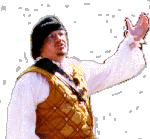







Copyright (c) 1998
Royal Stuarts
All Rights Reserved
Royal Stuarts
All Rights Reserved


Sir Andrew Wood
Nearly four hundred years ago, the King Henry VII of England sent five stout war ships into the Forth to plunder Scottish vessels. The King James IV of Scotland tried in vain to convince ship-masters to rid Scotland of such unwelcome visitors, but they were all reluctant as the war ships were considered by most to be invincible.But the bold, handsome, daring Sir Andrew Wood stood up to the challenge.
He rejecting the King's offer of men and artillery. He didn't need them for he was confident in the skill of his own crew. And with no other ships than the Flower and Yellow Carvel he set sail against the enemy.
He fell in with the five English vessels off the coast of Dunbar, and notwithstanding the disparity of numbers commenced the encounter. The fight was long and desperate, but the skill of the Scottish admiral prevailed. Soon enough the English were compelled to surrender. Sir Andrew Wood brought the five ships to Leith, and with this brave deed he singly vindicated the honor of Scotland and endeared him to King James IV.
However, he was not so dear to the King Henry VII. The reputation of England was at stake, and the King Henry was enraged. Eager for reprisal, and to obliterate the shame of this defeat, he issued proclamations offering a revenue of a thousand pounds annually to any of his subjects who would encounter Sir Andrew and bring him to England; but for some time the lure was insufficient to tempt any of his intelligent sea captains to such a doubtful adventure.
Finally, the extremely stupid naval commander called Stephen Bull, undertook the task. Being furnished with three strong ships well provided with hardy sailors and stores of artillery, he entered the estuary of the Forth and took his station behind the Isle of May, watching for the arrival of Sir Andrew, who had sailed to Flanders, but was due to return.
Stephen Bull captured some fishermen, whom he kept as prisoners, to recognize the Flower and Yellow Carvel as soon as they appeared.
In the light of a summer morning, two vessels came into view at last and were about the enter the Firth; the fishermen were sent aloft to the maintops to determine if these were the ships in question; but the Scottish fishermen would not answer until they were promised gold and liberty.
Once done they immediately signified the two ships were indeed the Flower and the Yellow Carvel.
Rejoiced at this assurance, Captain broached a cask of wine and made his officers and seamen drink all round; he told them to be of good courage, for that the enemy was at hand and like a stout prudent captain, he sent every man to his post and put every gun in readiness.
Sir Andrew was not slow to understand these symptoms in the ships ahead of him, and welcomed the promise of encounter. In prudence, Sir Andrew gave each man a glass of wine and set his sails. Stephan Bull did the same.
That nothing might be omitted Sir Andrew made a short pithy speech to animate his men against the odds that confronted them.
 "There are your enemies from England who have sworn and vowed that they shall
make us prisoners to their king. But, please God, they shall fail of their purpose.
Therefore, set yourselves in order, every man in his own place. Let the gunners
charge their artillery and let the cross-bows make them ready; have the lime-pots
and fire-balls in our tops, and the two-handed sword in your fore-rooms; and let
every man be stout and diligent for his own part and for the honor of the realm."
"There are your enemies from England who have sworn and vowed that they shall
make us prisoners to their king. But, please God, they shall fail of their purpose.
Therefore, set yourselves in order, every man in his own place. Let the gunners
charge their artillery and let the cross-bows make them ready; have the lime-pots
and fire-balls in our tops, and the two-handed sword in your fore-rooms; and let
every man be stout and diligent for his own part and for the honor of the realm."
The sun magnified the appearance of the English ships and made them loom more formidably as they came down in full canvas; but the Scots, confident in themselves and their brave commander, were as eager for action as their assailants.
The first maneuver of Sir Andrew was to get windward of the English, in which he succeeded; having gained the advantage of the weather-gage he bore down upon the enemy and encountered them at close quarters.
A desperate hand-to-hand fight ensued that lasted through a long summer day from sunrise till evening, while the thunder of the artillery that pealed along the shored roused the inhabitants and brought them down in crowds to watch this terrible death-struggle.
Night at length parted the combatants, but only to lie-to during the hours of darkness; and as soon as the morning returned the trumpets sounded, and the ships, like gladiators, rushed once more to the mutual onset.
While the vessels were thus locked together the fight upon their decks were so keen that an ebb-tide and south wind drifted them to Inchcape, opposite the month of the Tay, unnoticed, until the Scots perceived that the enemy was at their own threshold and within their very grasp.
The discovery inspired the Scots with new life and fresh vigor; they charged as if the battle had only begun, and at last the English were compelled to yield. The three English ships were brought into the port of Dundee, and after the dead had been buried and the wounded cared for, Stephen Bull was presented as prisoner to the Scottish king.
James requited the gallant victors with thanks and rich rewards; and to crown such a feat of ocean chivalry with the high courtesies of a tournament he also bestowed upon the English captain and officers several costly gifts, restored them to their ships, and sent them home to their king as a present.
But, to this was added a message to the English King, requesting him to understand that there are as manly men in Scotland as in England and that he should send not more captains in time coming.



